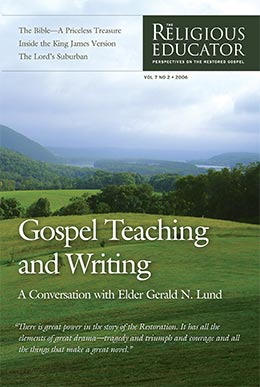Gospel Teaching and Writing: An Interview with Elder Gerald N. Lund
Paul H. Peterson
Paul H. Peterson, “Gospel Teaching and Writing: An Interview with Elder Gerald N. Lund,” Religious Educator 7, no. 2 (2006): 1–12.
Elder Gerald N. Lund of the Seventy was Area President of the Europe West Area when this was written.
Paul H. Peterson was chair of the Department of Church History and Doctrine at BYU when this was written.
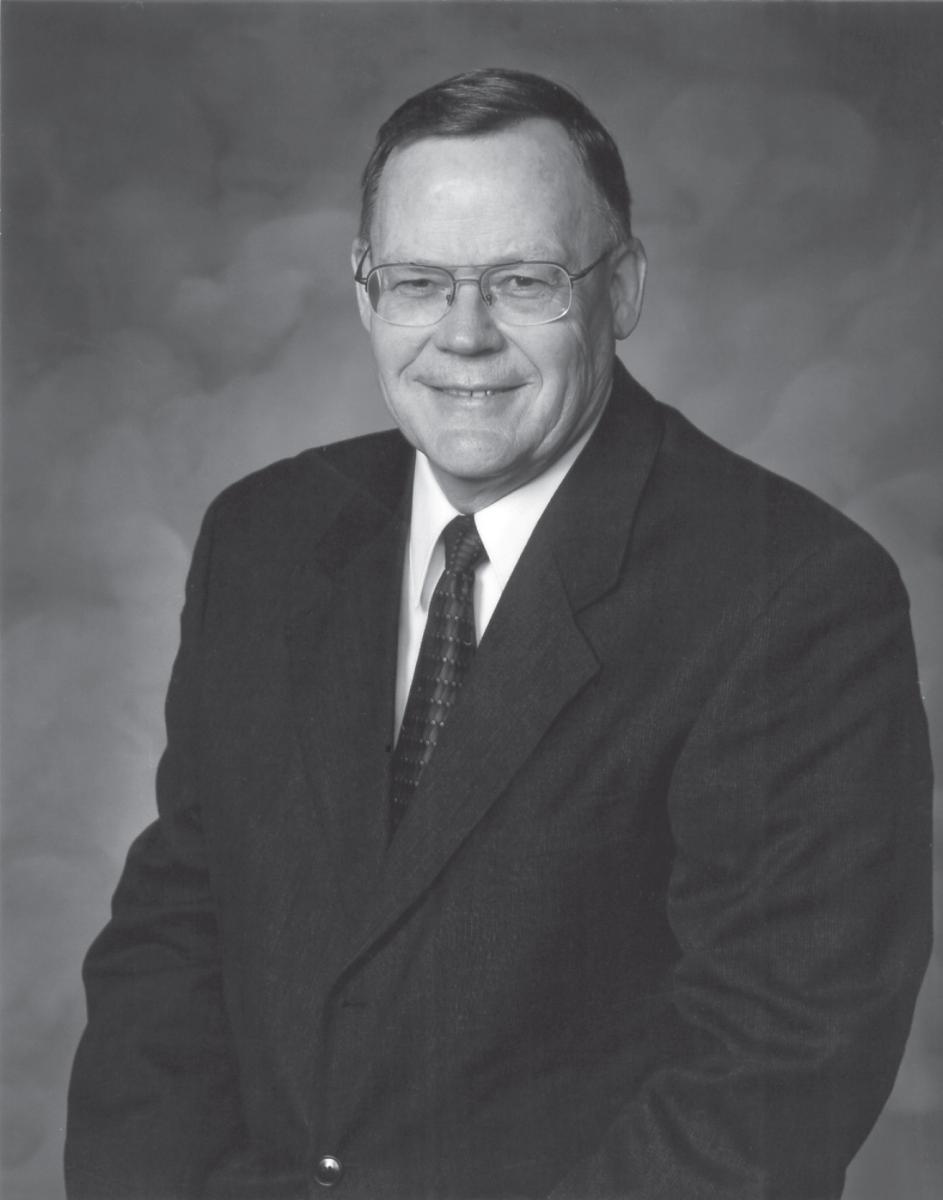 Elder Gerald N. Lund. Courtesy of Visual Resources Library.
Elder Gerald N. Lund. Courtesy of Visual Resources Library.
Recently, Paul H. Peterson sat down with Elder Gerald N. Lund to discuss Elder Lund’s prolific career in the Church Educational System (CES). Elder Lund reflects on nearly twenty years of teaching, writing, and publishing—including the challenges of writing historical fiction such as The Work and the Glory and The Kingdom and the Crown—along with the joy and complexity of life in the CES.
Peterson: How early in life did you decide that you wanted to be a teacher, and why did you cast your lot with the Church Educational System?
Lund: Well, first of all, I decided that I enjoyed teaching on my mission. Up to that point, right up to my mission, I had planned to go into social work for juvenile delinquents. When I came home from my mission, I realized that I really enjoyed teaching, especially teaching the gospel. My eventual employment with CES is really one of those experiences where I give full credit to the Lord. As an undergraduate at BYU, I had a class from Wes Belnap, who was then dean of the College of Religion (what it was called back then). It was the old class “Your Religious Questions.” Brother Belnap was a great teacher. He was very open, he was willing to listen to various sides, and he encouraged us to think—all that a university professor should be. I remember I responded to one controversial question in a way that was probably not what you would call “strictly Mormon.” But he gave me an A on the paper and then said, “That’s an interesting point you make, but suppose I said to you, ‘Let’s assume this is true—what would you do to try to justify it?’” That was an interesting thought process.
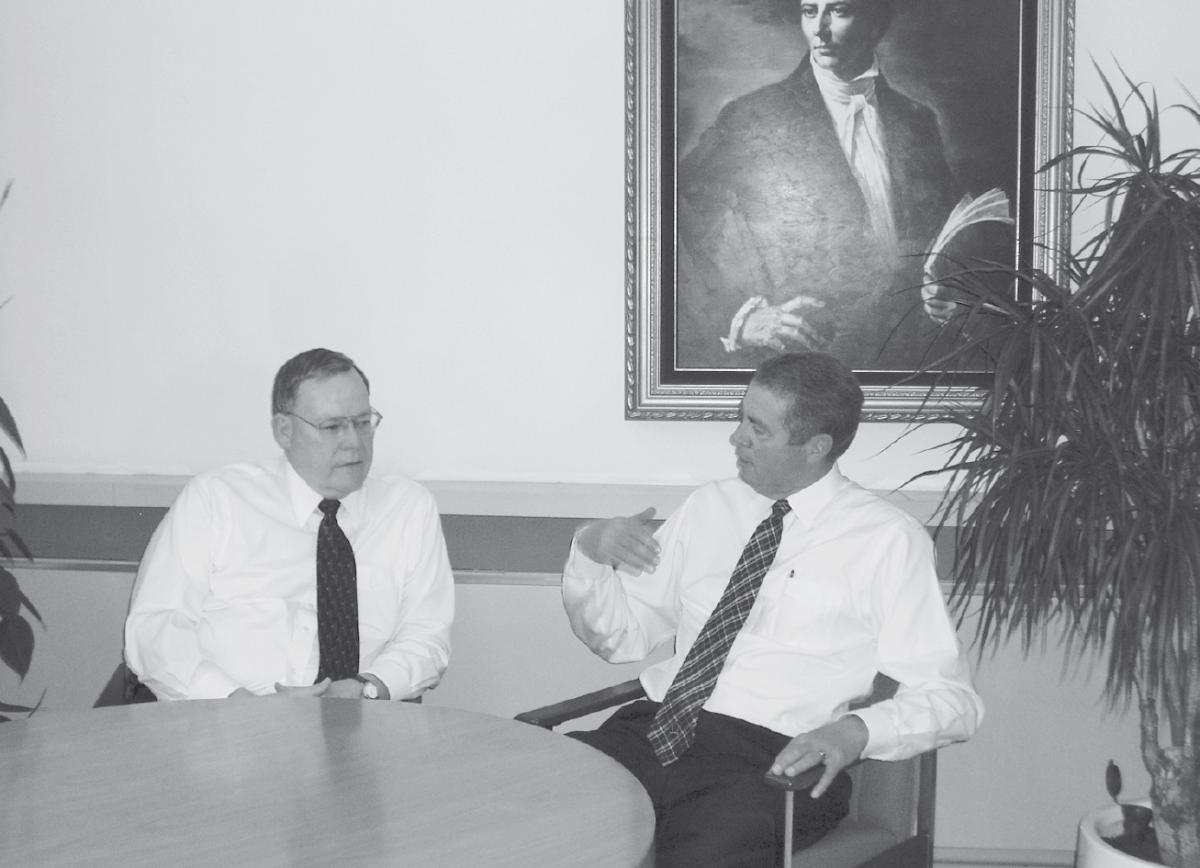 Elder Gerald N. Lund (left) with Paul H. Peterson.
Elder Gerald N. Lund (left) with Paul H. Peterson.
One day, as we finished class, Professor Belnap called me up and said, “Have you ever considered a career in seminary teaching?” I have got to admit, I didn’t even know there was such a thing as a career in seminary teaching. I went to seminary, but I didn’t know they paid the teachers. He said, “Let me give you the name of a couple of people you ought to see.” I took the class on teaching seminary, and here I am.
Peterson: When did you decide to begin writing, particularly fiction and historical novels?
Lund: Writing came when I had been with CES for about five years. I started collecting interesting quotes on the Second Coming, and then I would use them in class and firesides. People started saying, “How do you know this?” or “Where do we get those?” I’d say, “Well, you just go to a library.” They would reply, “But we don’t have access to the library like you do. Why don’t you write them up?” So I thought one night, “Why not?”
When I started the work on the Second Coming prophecies, I realized that writing was just another way to teach—to reach a much larger classroom, a broader audience. And I found it satisfying. I guess, to be honest, I got into writing fiction because of a conversation with my wife, Lynn. One evening when we were getting ready for bed, I was sitting on the edge of the bed taking off my shoes, and she was already in bed and said, “You know, Cyndie [our oldest daughter] wants to go to BYU next year. Just how did you plan to pay for that?” I said, “I’ve been thinking I’d like to try my hand at fiction. I’d really like to write a novel if I could just get a good idea.” She said, “Well, you love Israel. Why don’t you write a novel about Israel?” That idea clicked and was the beginning of One in Thine Hand, my first novel.
So, at first, fiction was just primarily entertaining, although I hoped to include a few gospel points in the result. But the more I did it, the more I realized that fiction is a wonderful way to bring people into the “classroom” whom you couldn’t bring in any other way. I realized this when I had a thirteen- or fourteen-year-old boy come up to me and say, “I love your book The Alliance. I’ve read it twelve times now.” I said, “Wow, twelve times—that’s a lot.” He said, “You know what I finally realized? You’re trying to teach me about moral agency, aren’t you?” I said, “Bingo.” But if I had tried to sell him a book on agency or freedom, he would never have picked it up. And that became especially true with historical fiction. As I finished other novels, I realized that there are great things to teach about Church history and that writing is a wonderful way to get people into that wider “classroom.”
And let me add one more thing about the influence of writers. Probably one of the most influential things I’ve ever read was by Eric Ambler, a spy novelist. He said something like, “Whatever else a novel may do, it needs to entertain. Otherwise, it is just a tract.” That intrigued me. I looked up entertainment in the dictionary and found out that the Latin root means “to seize” or “to grab.” And that’s what a really good story does. There are nonfiction writers and historical writers who can write history that grabs you just like fiction. No matter what it does religiously, if it isn’t entertaining, it is only a tract.
Peterson: Is the ability to write that kind of novel—the kind that grabs you—essentially a gift? To what extent can it be cultivated?
Elder Lund: I have thought about that a lot. In a way, a gift implies something innate, something you have. There is always the possibility of someone possessing a natural talent. But first of all, thanks to good parents, I have been reading all my life and reading broadly. My dad was that way; he had a very broad interest. So I have been reading books for many, many years, and without even consciously thinking about it, I started to sense what makes a good story. I would ask myself, “Why do I like this?” or “Why do I not like this?” And then I would read what writers had to say about the skills of writing and try to see the things they do. I think the problem with many writers is that they have a message they are trying to push instead of trying to hook the reader. Another author said, “A good novel always has a hook at the end of every chapter.” And that’s what people mean when they say, “This is a real page-turner” or “I couldn’t put it down.”
So is the ability to captivate readers a gift or the result of learning from very good writers? It is probably more the latter than the former. Certainly it makes us feel comfortable to look at somebody who does something well and say, “Oh, well, that’s their gift.” It gets us off the hook from having to work. In reality, it is hard to write a book, and the truth is that it takes a lot of time. I think Will Durant said something like, “Only 10 percent of genius is intelligence. The other 90 percent is harness.”
Peterson: Elder Lund, it seems you take every occasion to teach and illuminate gospel principles. Was teaching and illustrating gospel truths one of your major focal points or a foremost objective in your historical novels from the beginning?
Lund: Well, I’m not sure it was as defined as that from the start. But after I had written four novels, which were mostly entertaining, I realized I only had a certain amount of time in life. So when I started on The Work and the Glory, for example, I basically said, “I can teach while writing. Why just throw another book on the shelf? Why not take advantage of the opportunity to teach and write at the same time?” I love to teach; I’m a teacher first and a writer second.
Peterson: How much of your writing—your vivid descriptions, for example—is based on research, and how much is primarily the result of disciplining yourself through the years to have ears that hear and eyes that see?
Lund: Well, I’ve always loved to observe people. I wait in airports quite a bit, and I don’t mind just sitting there watching people go by. I love to watch people; I like to observe things. Ultimately, it requires more than simple research. For example, if you’re going to write a book on Trieste, Italy, books exist that tell you where the hotels and landmarks are. But I really believe that if you haven’t been there, you can’t describe it as well. I remember an evening at the Temple Mount in Jerusalem. Earlier in our meeting we had sung “Jerusalem the Golden,” and as I watched the sun go down and saw everything either bathed in a golden glow or in silhouette, the song and the setting came together and vivified the image of that beautiful, golden evening in my mind. So when I wrote a description of Jerusalem at sunset as seen from the Mount of Olives (in The Kingdom and the Crown), that scene came back to me. The images mostly come out of experience. With that said, however, description was the hardest thing for me as a writer. Dialogue came easier to me. You just have to sit down and hammer and hammer the words until they start to make sense; now it comes easier.
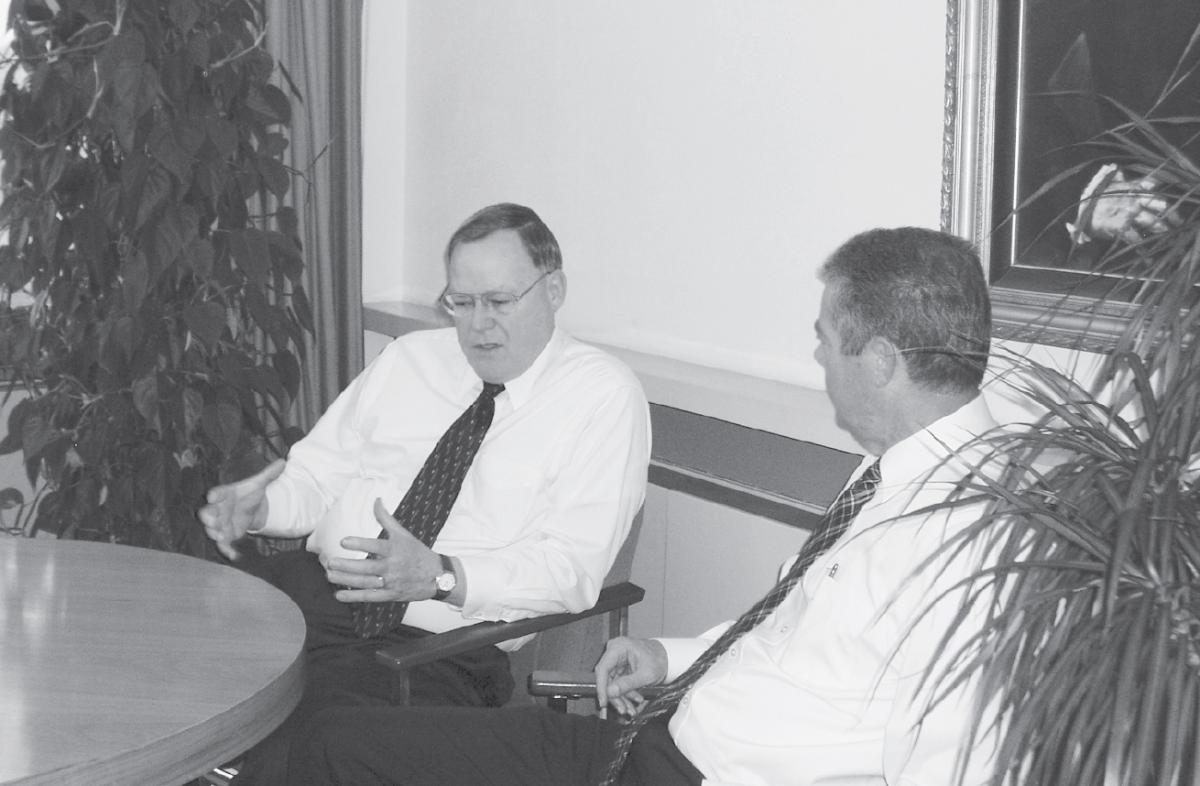
Peterson: How much research did you do for your most recent historical novels—the Kingdom and the Crown series?
Lund: Well, when I was at Pepperdine University, I took some ancient history and cultural New Testament classes where I learned much about the contextual setting of the New Testament, and I began collecting material for a New Testament novel. By the time I was approached with the concept of doing The Work and the Glory, I already had three chapters of the New Testament novel done. I set it aside for ten years, which was a real blessing because it significantly changed the nature of that project into what The Kingdom and the Crown is today. As a result, before I ever began writing The Kingdom and the Crown, I had a whole cabinet full of three-by-five cards, probably close to a thousand cards for Roman culture, Roman history, and Palestinian culture. So when I actually came to writing the series, I had to go back to those sources and read them a lot, but most of the basic research had been done.
Peterson: In The Kingdom and the Crown series, you alluded to the challenge of interpreting scriptural text. Did the creating of such text also provide you with some of your more meaningful and inspiring moments during the composition process?
Lund: Yes, and this brings together some of your previous questions. Sometimes I thought, “Here’s a common thing many people don’t understand—a parable that’s confusing, for example, or one that we hardly ever talk about.” Most of the content of those explanations comes from such latter-day Apostles as Elder James E. Talmage and Elder Bruce R. McConkie. Obviously, in the writing I had my fictional characters. I do get nervous about putting doctrinal words into the mouth of Peter, for example, and I was very careful not to have him say things that are not in the scriptures. But it seemed like a legitimate thing to have a fictional character interact with real people. It seemed very real to me that such a person would have attended one of those sermons. It was a device, but it did make me a little nervous, and I tried to be very reverent because I was dealing with men we respect and honor.
Peterson: Even though as an author you incorporate your own words in your stories, the reader has the feeling that it is the voice of Joseph or of Jesus or Peter. How do you accomplish that?
Lund: Let me see if I can say it this way. Some people come up to me and explain that they previously had been totally inactive. “But,” they say, “your books changed my life, got me active again, and helped me to readjust.” Whatever the story, I always feel awkward about that, and I finally discovered why. There is great power in the story of the Restoration. It has all the elements of great drama—tragedy and triumph and courage and all the things that make a great novel. If I had made up that whole story, I would have every reason to be proud. But it’s really not my story—it’s God’s story. I’m just the storyteller. And the power to change lives rests in those original people; it rests in the Savior and in His teachings; it rests in Joseph and what he was and did. It is a great privilege to be a storyteller, and I am very happy that I am able to do that, but I don’t ever forget where the real power lies. So I have tried to be true in collecting and expressing that power, and I’ve tried to help the reader sense that power too. That power is what truly motivates us to change. The books are merely a medium to get us where we ought to be.
Peterson: With your calling to the Second Quorum of the Seventy, you obviously have a host of responsibilities. Is there any time for writing?
Lund: In a word, no. Not writing in the sense you mean. I spend a lot of time at the computer entering letters, creating training programs, and so forth. So I do a lot of writing, but not fictional writing for the LDS market or any other market at this time. There are so many other things going on, and this is a wonderful time for my wife and me to share together. I’m not very excited about spending all day at the office and then going home and saying to her, “I’ll see you in a couple hours because I want to spend all night writing.” I suppose I could find the time if I really pressed for it. But for now I’m satisfied with letting this calling take priority over writing. Originally, The Kingdom and the Crown was going to be five volumes because I really wanted to tell the story of the apostolic ministry. So that may be where I’ll go first when I am released and get back to writing.
Peterson: As a person who has devoted his lifetime to teaching gospel principles either through verbal or written expression, what advice would you give those who teach religion for their livelihood? How can they enhance their preparation or presentations?
Lund: That is a very thought-provoking question, and I have thought before of what influences are most important to us in that. Brother Ross Cole, a colleague in CES, frequently used the phrase “to have the heart and mind of a religious educator.” I thought a lot about that and wondered what it means. I finally decided that the best way to describe it is captured in the story of Elder Henry B. Eyring and his father. Elder Eyring’s father used to put calculus problems on the chalkboard in the basement and have his sons solve them. He came back one day and found a problem was still there without being solved. So he called Elder Eyring and said, “I see you didn’t solve that calculus problem. Let me ask you a question, ‘What do you think about when you don’t have to think about anything else?’” For me, that’s really what it means to have the heart and mind of a religious educator, a gospel teacher. I think about teaching all the time. I read about something in the newspaper, and I think, “Hmm, that would be a great example to use in class.” So that’s one thing. But probably far more important were the influential teachers I had. I’d walk out of their classes and say, “If I could do for others what these people are doing for me, I’d be satisfied with life.” So I began to watch and learn from the best religious educators (many of whom, such as the Brethren, were not that by profession) and try to identify and articulate what it is they do, particularly skills like scripture teaching. I’d try to identify things like that and incorporate them into my life and practice them. That became very helpful for me. I still do it. I watch the Brethren now. In addition to listening to their messages, I watch them as teachers—and it’s very motivating to learn from them.
Peterson: What have you learned since you have been a General Authority?
Lund: If I were to summarize, I guess the primary thing I’ve learned is that what we are becoming is much more significant than merely what we do and what we say. That’s a simple but profound statement because you don’t just say, “I’m going to become something today.” It is a long, slow process where the Lord has to take your hand. And that lesson has probably come as much from watching the senior Brethren as anything else. You see what they have become—what they say and do. The outcome is really inspiring. President Hinckley is the consummate example of that.
Peterson: Do you think it is helpful to write even if the material is not published? The Religious Educator, for example, has turned down manuscripts, and, as a result, the author might say, “Well, I just wasted my time.” Even if it doesn’t see the light of day, is it valuable?
Lund: I think those who say that have the wrong picture. Writing can still be good for you because you have an opportunity to sit and think and write logically. I often have people say, “I’d like to be a writer. What advice could you give me?” I have six pieces of advice: Read. Read. Read. Write. Write. Write. Because writing is a craft, you have to work at it. Another statement that had a big influence on me is, “Good books are not written; they’re rewritten.” It’s the same with music and with poetry. You just hammer and polish and revise, and that’s how to learn the craft. But there should be great satisfaction in taking something and organizing it and putting it on paper, even though it is never published.
Further, just the sheer exercise of writing makes you a better writer. I really believe that. I have got a nine-hundred-page novel sitting on my shelf at home that never saw the light of day—the first one I wrote, and it was for the world market. I thought I could break into that market, so I wrote it and got a devastating review back. I couldn’t stand to read that letter. It was so painful that I didn’t open it again for three months. But after absolutely devastating me, the reviewer said, “I think you have promise in your writing. This work is not salvageable in my mind. Just put it aside and go on to something else.” So I did.
Peterson: How valuable is it for seminary teachers, institute teachers, religious professors at BYU, and so on to do research with members of other faiths and outside sources?
Lund: Well, let me answer that by telling you a story that kind of strikes a balance. When I finished my master’s degree in sociology, I vowed that I would never again spend that much time on a worthless project as I did on my thesis. It was a good thesis for what it was, but as far as meaning something to me and to the world, it was just several hundred hours of grunt work. So that’s when I decided I wanted to study the Bible. And I went looking; I applied to and was accepted at the Claremont Graduate School—the premiere Bible-oriented theological school west of the Mississippi—because I said I wanted to get a doctorate in that field. I was actually standing in the registration line, three people from the front, when suddenly I had this overwhelming feeling, “What are you doing here? This is not what you want.”
And so I turned around, ripped up my check, and walked away. That was one of those times when the Lord really took a hand in my life. I started looking, and I eventually found Pepperdine University, owned by the Church of Christ. They are conservative Christians who believe in the divinity of Christ and treasure the Bible. So I was still studying outside of Latter-day Saint culture but not immersing myself in the worldly (that is, countergospel) philosophies. There are some who say if we don’t study everything the world has, we can’t contribute to it. But there is so much out there that is off base and so corrupt that I think we have to be very careful. On the other hand, there are so many insights about history and culture and the language to be gained—it’s like taking a table lamp and focusing it on a particular scripture passage. And obviously, from my writing, I love that sort of thing because it illuminates the gospel so much more. So I think a person, if he or she is wise, can use outside sources as a tremendous and enriching aspect of teaching.
When I was in California, every time I had a chance, I used to go to used bookstores to peruse the religious books. I found that most of the nineteenth-century Bible scholars were “believers,” whereas many of the twentieth-century scholars were not. And so I quickly identified Bible dictionaries, encyclopedias, and commentaries that are useful and others that are not. They became very valuable resources, and they still are. In fact, I think the Doctrine and Covenants suggests that we ought to be studying these fields, gleaning what we can (see D&C 88:78–79, 118).
Peterson: What are the challenges and benefits of writing alone versus writing with others?
Lund: Writing alone is much less frustrating, but it is probably much more dangerous, particularly when you are writing about the gospel. There is something great that happens when you get several good minds, faithful people, together and interact. It is the priesthood principle of councils. When I was involved in writing institute curriculum, I recall that we used to call our review sessions the abattoir, which is the French word for “slaughterhouse,” because in them you sometimes felt like you were being cut to ribbons. But out of that came something better than what you had to begin with.
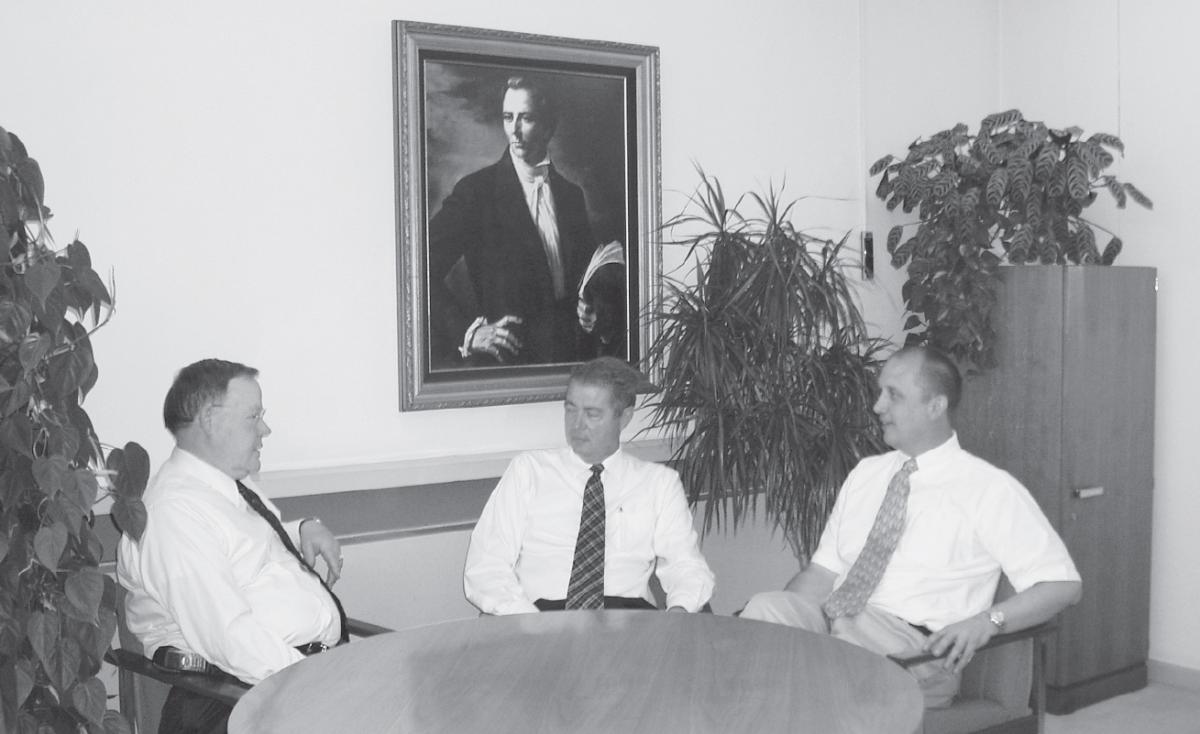 Elder Lund, Paul H. Peterson, and Richard Neitzel Holzapfel
Elder Lund, Paul H. Peterson, and Richard Neitzel Holzapfel
On the other hand, unless you get a really tremendous working partnership, it can be very frustrating to writers who want to work alone. I suggest following the rule of having six, seven, or eight people read your manuscript. When you are writing alone, you can get away from that “joint-author” frustration, but there is no built-in safeguard against “falling off the cliff.” So having people of wisdom and intelligence give you feedback is valuable. The first and most valuable reader for me is my wife because she has read all her life and has a good sense of what works. The second thing that makes her so valuable is that she is completely honest. Everybody else says, “Oh, this is wonderful.” She’ll say, “When you have that character do that, I don’t like it. I don’t like it at all.” And I listen.
Peterson: One of the dangers of being CES instructors or BYU professors—teachers who spend a lot of the time in gospel teaching—is that they may not always live what they teach. What are things you have done to keep the gap between knowing the gospel and living it as small as possible?
Lund: Well, there is always the rigorous self-examination that has to be going on, particularly for a teacher. One of my first principals, years and years ago while I was still in seminary, was Wally Montague. He made an interesting comment one day. He said, “There’s a real danger for a teacher, particularly a gospel teacher. The better you get at teaching, the greater the danger.” I said, “I don’t know what you’re talking about.” And he said, “Well, for example, you finish a class and somebody comes up and says, ‘Oh, Brother Lund, class was terrific today.’ And quietly you say in your heart, ‘Yeah, it really was.’”
I had done this before, so his words hit home pretty hard. So I asked, “What do you do? How do you protect yourself against that danger?” And he said this: “Number one, in every prayer, you always remind yourself and thank God for the gift. Because no matter how much you have developed your ability to teach, the gift basically, ultimately, comes from Him. Then, number two, you pray that you can develop that gift and use it for His purpose and His glory and not your own.” That has stuck with me a long time. And that is why I made the comment about what I have learned as a General Authority. You have to think about that all the time: What am I becoming? What am I doing? The natural man always thrives within us, so you always have to watch yourself and know yourself. For example, you need to ask yourself, “Does this accolade mean I’m a better person? If I’m not, who cares about the honors of the world?” On the other hand, look at President Hinckley. Much of the honor he now receives is because of what he has become—not just because he is a gifted, brilliant man. I think it always comes down to that rigorous self-examination, always measuring yourself against the ultimate measuring stick, our Savior and Heavenly Father.
Peterson: With all of your extensive reading and reflection on the life and mission of our Savior, what is the most important truth, assuming there is only one, you have learned about Jesus of Nazareth?
Lund: Well, let me preface my answer by saying that in the process of researching and writing about the Savior, I think I’ve learned more about myself. One thing I’ve learned is that you can never separate the Savior from the Father because they are so closely linked together. Another thing that has probably settled in more in the last decade of my life is just how literally incomprehensible is the mercy, love, and endless grace to us from the Father and the Son. I have never viewed God as harsh or punitive, but I have come to realize that, as it says in section 76 of the Doctrine and Covenants, He really does delight to honor us (see D&C 76:5). Delight is a verb I would have never thought of using with the Father and the Son. But everywhere we turn we see the mercy of God and His great love for us.

I will give you a final example. It is a simple example that happened when we were visiting for general conference in April 2005. We had all our family at home. Most were out in the backyard. I was sitting in the family room with one of our adult children. We were talking; we didn’t have the television on. And suddenly my three-year-old granddaughter stood before me. She said, “Grandpa, can I watch TV with you?” I said, “Sure.” So she climbed up in my lap, and I turned on a cartoon channel. Two minutes later, she was sound asleep, and I realized that she wasn’t interested in television at all; she just wanted a safe place where she felt completely secure. And I was delighted that she chose me. After that happened, I thought, “That’s exactly how the Father is. When we come to Him for safety and security and blessings, He is delighted to respond.”
